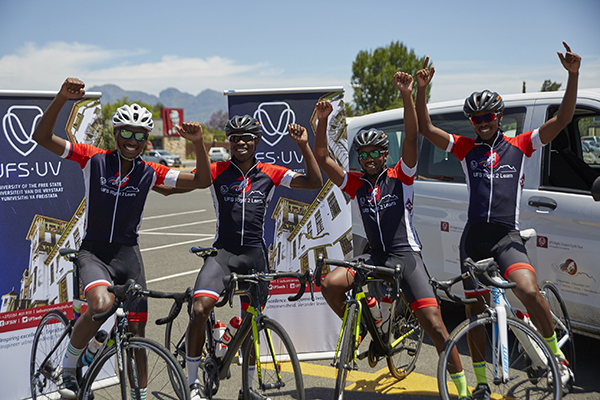
The Right to Learn cycling team are happy and thankful that they have completed
their journey.
Photo: Mike Rose
After a seven-day journey, the Right to Learn cycling team have finally reached their destination. Having travelled for over a 1 000 kilometres from Bloemfontein, they arrived safely in the Paarl on Monday 4 December 2017. During their final stretch, they travelled 130 kilometres from Montagu to Paarl, where they ended the Right to Learn Cycling Tour.
Gratitude for support
Asive Dlanjwa, Bloemfontein Campus SRC President, says, “It's been good, it's been tough, and it’s been an amazing journey.” He expressed his gratitude to everyone who has been supporting them throughout the journey. “Thank you so much for every cent that you have given, for every prayer, and every thought.”
Thulasizwe Mxenge, one of the guest cyclists from Johannesburg, says, “Asive had informed us that most students struggle with access to higher education, and we saw the need to assist and take part in the initiative.” He says the journey was tough, because they had to cycle for about five hours every time they went on the road. “I’m very tired but also happy to have completed the journey.”
Donations received
Since the beginning of the Right to Learn initiative, they have managed to raise R80 000 through corporate giving, R15 584 on Dlanjwa’s GivenGain page, and $500 (about R6 845) from the GivenGain Foundation as part of the #GivingTuesday Twitter campaign which took place on 28 November 2017.
Annamia van den Heever, Director: Institutional Advancement, says, “Congratulations to Asive and the team! It has been an absolute pleasure to work with such positive and passionate young people.” She also thanked all donors to the Right to Learn campaign for their support, saying it will ensure that talented students who cannot afford university fees will have access to the UFS next year. “We are hoping that more people will donate now that the tour has been successfully completed. There is no better Christmas gift,” she says.
Dlanjwa says, “We are committed to helping learners who are coming to the UFS next year. The trip was amazing and I feel stronger than I expected. I’d definitely do this again.”
The community is still encouraged to donate towards the initiative, using the following details:
EFT transaction:
Please use the following bank details:
Bank: ABSA Bank
Account Number: 1570850721
Branch Code: 632005
Account Type: Cheque
Reference: R2L: Right to Learn
Send the proof of payment to Rinda Duraan: duraanmj@ufs.ac.za
Debit order: Download the form and email it to Rinda Duraan
All donations are tax deductible in terms of South African income tax legislation.